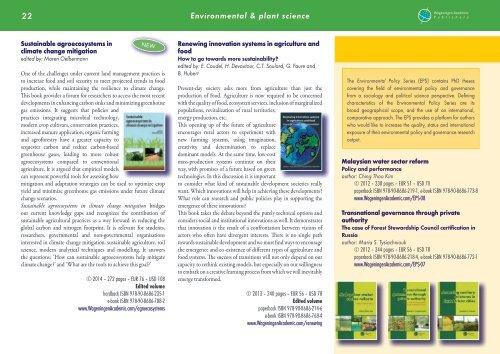Wageningen Academic Publishers - Catalogue 2015
Wageningen Academic Publishers - Catalogue 2015
Wageningen Academic Publishers - Catalogue 2015
Create successful ePaper yourself
Turn your PDF publications into a flip-book with our unique Google optimized e-Paper software.
22 Environmental & plant science<br />
<strong>Wageningen</strong> <strong>Academic</strong><br />
P u b l i s h e r s<br />
Sustainable agroecosystems in<br />
climate change mitigation<br />
edited by: Maren Oelbermann<br />
NEW<br />
One of the challenges under current land management practices is<br />
to increase food and soil security to meet projected trends in food<br />
production, while maintaining the resilience to climate change.<br />
This book provides a forum for researchers to access the most recent<br />
developments in enhancing carbon sinks and minimizing greenhouse<br />
gas emissions. It suggests that policies and<br />
practices integrating microbial technology,<br />
modern crop cultivars, conservation practices,<br />
increased manure application, organic farming<br />
and agroforestry have a greater capacity to<br />
sequester carbon and reduce carbon-based<br />
greenhouse gases, leading to more robust<br />
agroecosystems compared to conventional<br />
agriculture. It is argued that empirical models<br />
can represent powerful tools for assessing how<br />
mitigation and adaptation strategies can be used to optimize crop<br />
yield and minimize greenhouse gas emissions under future climate<br />
change scenarios.<br />
Sustainable agroecosystems in climate change mitigation bridges<br />
our current knowledge gaps and recognizes the contribution of<br />
sustainable agricultural practices as a way forward in reducing the<br />
global carbon and nitrogen footprint. It is relevant for students,<br />
researchers, governmental and non-governmental organisations<br />
interested in climate change mitigation, sustainable agriculture, soil<br />
science, modern analytical techniques and modelling. It answers<br />
the questions: ‘How can sustainable agroecosystems help mitigate<br />
climate change?’ and ‘What are the tools to achieve this goal?’<br />
© 2014 – 272 pages – EUR 76 – USD 108<br />
Edited volume<br />
hardback ISBN 978-90-8686-235-1<br />
e-book ISBN 978-90-8686-788-2<br />
www.<strong>Wageningen</strong><strong>Academic</strong>.com/agroecosystems<br />
Renewing innovation systems in agriculture and<br />
food<br />
How to go towards more sustainability?<br />
edited by: E. Coudel, H. Devautour, C.T. Soulard, G. Faure and<br />
B. Hubert<br />
Present-day society asks more from agriculture than just the<br />
production of food. Agriculture is now required to be concerned<br />
with the quality of food, ecosystem services, inclusion of marginalized<br />
populations, revitalization of rural territories,<br />
energy production, etc.<br />
This opening up of the future of agriculture<br />
encourages rural actors to experiment with<br />
new farming systems, using imagination,<br />
creativity and determination to replace<br />
dominant models. At the same time, low-cost<br />
mass-production systems continue on their<br />
way, with promises of a future based on green<br />
technologies. In this discussion it is important<br />
to consider what kind of sustainable development societies really<br />
want. Which innovations will help in achieving these developments?<br />
What role can research and public policies play in supporting the<br />
emergence of these innovations?<br />
This book takes the debate beyond the purely technical options and<br />
considers social and institutional innovations as well. It demonstrates<br />
that innovation is the result of a confrontation between visions of<br />
actors who often have divergent interests. There is no single path<br />
towards sustainable development and we must find ways to encourage<br />
the emergence and co-existence of different types of agriculture and<br />
food systems. The success of transitions will not only depend on our<br />
capacity to rethink existing models, but especially on our willingness<br />
to embark on a creative learning process from which we will inevitably<br />
emerge transformed.<br />
© 2013 – 240 pages – EUR 56 – USD 78<br />
Edited volume<br />
paperback ISBN 978-90-8686-214-6<br />
e-book ISBN 978-90-8686-768-4<br />
www.<strong>Wageningen</strong><strong>Academic</strong>.com/renewing<br />
The Environmental Policy Series (EPS) contains PhD theses<br />
covering the field of environmental policy and governance<br />
from a sociology and political science perspective. Defining<br />
characteristics of the Environmental Policy Series are its<br />
broad geographical scope, and the use of an international,<br />
comparative approach. The EPS provides a platform for authors<br />
who would like to increase the quality, status and international<br />
exposure of their environmental policy and governance research<br />
output.<br />
Malaysian water sector reform<br />
Policy and performance<br />
author: Ching Thoo Kim<br />
© 2012 – 238 pages – EUR 51 – USD 70<br />
paperback ISBN 978-90-8686-219-1, e-book ISBN 978-90-8686-773-8<br />
www.<strong>Wageningen</strong><strong>Academic</strong>.com/EPS-08<br />
Transnational governance through private<br />
authority<br />
The case of Forest Stewardship Council certification in<br />
Russia<br />
author: Maria S. Tysiachniouk<br />
© 2012 – 344 pages – EUR 56 – USD 78<br />
paperback ISBN 978-90-8686-218-4, e-book ISBN 978-90-8686-772-1<br />
www.<strong>Wageningen</strong><strong>Academic</strong>.com/EPS-07


